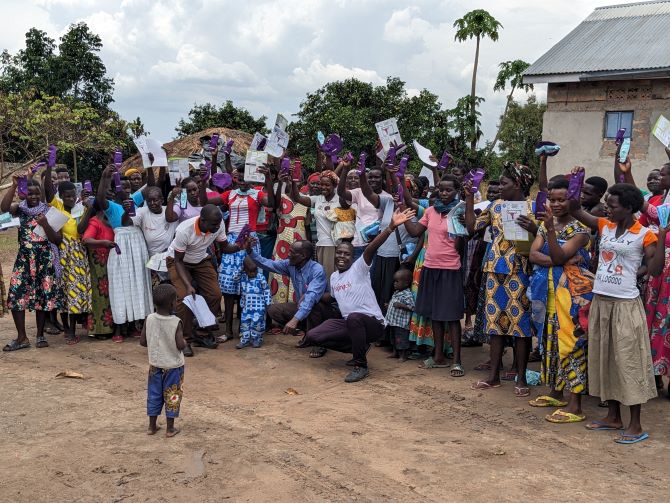SOROTI, February 26, 2024 – At least 136 women, girls, and men in Kokumu village, Lalle Sub-county in Soroti district have been equipped with skills in making reusable sanitary pads, and liquid soap for menstrual hygiene management [MHM].
Eric Omondi, Lead Trainer/Founder Advocates for Sustainable Wealth and Health Africa [ASHWA], a non-governmental organisation headquartered in Busia district, said the skills training is geared at empowering women and girls in the rural communities of Uganda to remain active whether at home or in schools.
According to him, most rural women and girls lose a lot of their productive time during menstruation because they can not afford to buy the sanitary pads available on the local market.
During the five-day training, Omondi emphasised that cotton materials are the best in making sanitary pads.
He said those trained in making the sanitary pads will be able to train more two people each in their respective communities. “We hope that they will will each train more two people in there communities that will change their lives,” Omondi said.
Omondi also said besides making pads they have trained the women on making liquid soap and keeping proper hygiene when in their periods to avoid contracting infections. “We decided to train them on how to make liquid soap so that they can keep proper hygiene and also generate income for their households,” he added.
On his part, Aaron Edonyu, ASHWA’s Project Officer, called upon local leaders in Soroti district to support the trainees, saying that it would help create more impact in the communities.
“Local leaders should support this women, connect them to schools where they can continue producing the materials for other communities,” he said.
However, the trainees on their part were happy with the practical skills obtained, saying they will put them to good use.
Peter Amecu, one of the male trainees said with the skills he gained, he will be able to make menstrual pads for his daughters but also for sale.
“Now that I and my wife have learnt how to make sanitary pads, we shall be able to save money because buying pads has been expensive,” said.
On her part, Proscovia Asio, also a trainee, said she will no longer have to use rugs when the periods strike since she has been empowered to make her own sanitary pads.
However, she requested local leaders to support her and others so that they can produce the menstrual pads on commercial basis, especially targeting girls in learning institutions.
She continues: “We need our leaders to link us to some schools so we can train girls in making sanitary pads and liquid soap for use.”
According to the Menstrual Health Country Snapshot for Uganda, the increase in school absenteeism among girls is partly attributed to starting their periods.
Research from the 2020 situational analysis report by the Ministry of Education and Sports further indicated that more than half of girls that enroll in primary one drop out before sitting their Primary Leaving Examinations mainly because of menstrual challenges such as inability to afford sanitary products such as pads, 77 percent of girls miss two – three days of school due to menstrual-related challenges.
Further, a study commissioned by the Netherlands Development Organization [SNV] indicated that 65 percent of girls and women in Uganda are unable to fully access and meet their MHM needs from 140 schools in Uganda 70 percent of adolescent girls mentioned menstruation as a major hindrance to their optimal performance at school.
ASHWA focuses on promoting the well-being and ensuring healthy lives for all as well as empowering young people to take greater control of their health by adopting better practices and lifestyles through social mobilisation and policy advocacy for improved health care services delivery for instance, HIV/AIDS, TB, water, sanitation, and hygiene, and menstrual hygiene management among others.
Buy your copy of thecooperator magazine from one of our country-wide vending points or an e-copy on emag.thecooperator.news
